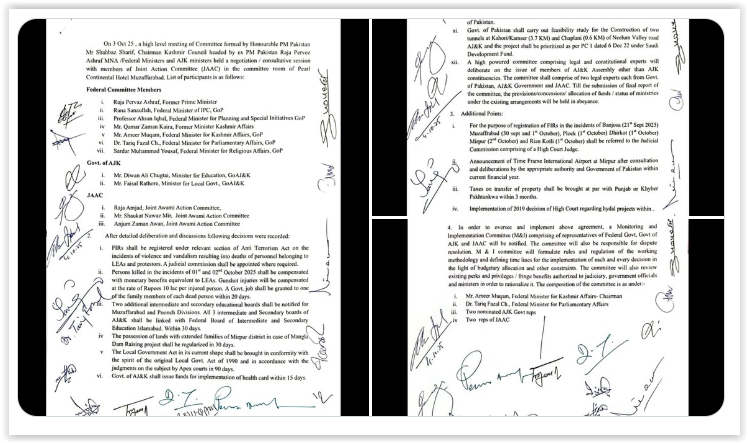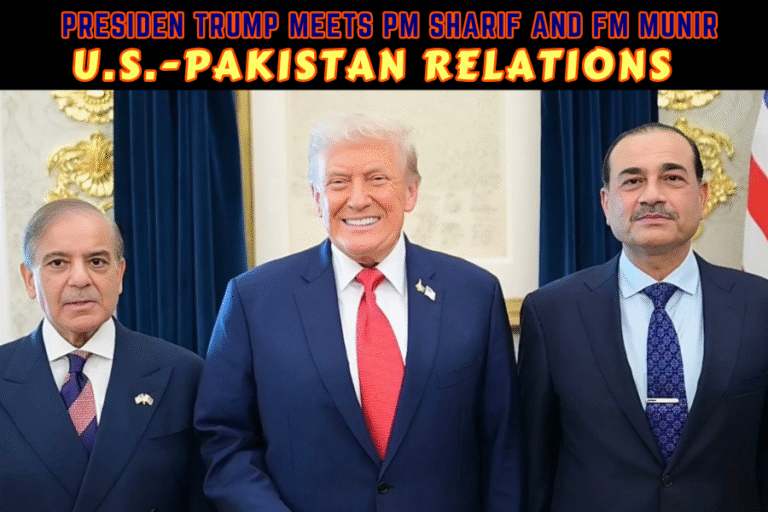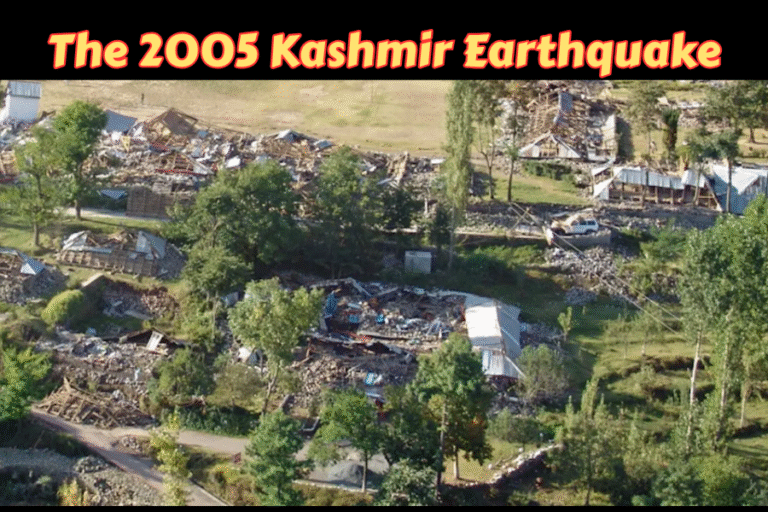(By Khalid Masood)
The October 4, 2025, peace accord between the Joint Awami Action Committee (JAAC) and Pakistani authorities has brought an end to days of unrest in Azad Jammu and Kashmir (AJK), but one element continues to spark debate: the handling of 12 reserved seats in the AJK Legislative Assembly for refugees—primarily those displaced from Indian-administered Jammu and Kashmir and now residing in Pakistan proper. While the JAAC demanded outright abolition to eliminate external influence and elite capture, the agreement stops short of immediate elimination. Instead, the government has committed to initiating debates and discussions in the assembly, alongside consultations with intelligentsia and legal experts, to reach a “logical conclusion.” This includes forming a constitutional committee to review the issue, as announced by Federal Minister Ahsan Iqbal. Critics and analysts from refugee advocacy circles warn that even this measured approach could plant seeds of alienation, with far-reaching implications for unity, diaspora engagement, and high-stakes scenarios like a potential UN plebiscite.
Historical Context: Seats as a Bridge to the Past
Established under the 1974 AJK Interim Constitution, these reserved seats were designed to represent the broader Jammu and Kashmir populace, including those who fled violence and displacement during the 1947 partition and subsequent conflicts in 1965, 1971, and beyond. Analysts highlight the immense sacrifices of these refugees: estimates suggest over 400,000 lives lost in massacres, with entire communities—many from Gujjar, Bakarwals and Pahari backgrounds—uprooted, their properties seized, and families enduring decades of poverty and suspicion in Pakistan. These seats, elected by voters across Pakistan’s provinces, were intended as a symbolic and practical link, ensuring the voices of the displaced remained part of AJK’s political fabric and reinforcing Pakistan’s claim over the disputed territory.
In practice, however, the system has faced allegations of manipulation, including fraudulent voter registrations that allow non-Kashmiris to influence outcomes. Proponents of change, including JAAC representatives, contend that the seats enable federal overreach, diluting local AJK residents’ control in a 53-member assembly where outsiders can tip prime ministerial selections without living under the laws they help shape. Yet, diaspora analysts counter that the flaws warrant targeted reforms—such as stricter verification—rather than risking abolition through ongoing reviews, emphasizing that these seats remain the sole formal tie for many refugees to their ancestral homeland.
Immediate Ramifications: Dialogue as a Double-Edged Sword
The agreement’s promise of assembly debates, expert consultations, and a dedicated committee has been positioned as a consensus-building measure, part of a broader package addressing subsidies, infrastructure, and anti-corruption. JAAC leaders have hailed it as progress toward a “people’s victory,” while the government frames it as responsive governance. However, this deferred approach raises concerns about implementation timelines and potential dilution of the demand. Critics argue it could still lead to alienation if discussions favor abolition, transforming refugees from honored stakeholders into sidelined figures and fostering resentment among groups already facing linguistic and social biases in professional opportunities within Kashmiri institutions.
Some analysts point to disparities: while later migrants from the 1989 Valley unrest have adeptly navigated systems for educational and economic gains, earlier Jammu refugees often endure exclusion, with the review process potentially exacerbating perceptions of favoritism toward certain ethnic or regional factions. Observers caution against inflammatory rhetoric during these debates, advocating principles of restraint to prevent escalation, as divisive narratives could deepen intra-community rifts.

Far-Future Implications: Division, Diaspora Drift, and Plebiscite Perils
Looking decades ahead—perhaps to 2030 or beyond—the outcome of these promised discussions could profoundly shape the Kashmiri cause. If debates culminate in abolition, it may signal to Jammu’s predominantly Gujjar and Pahari refugees that mainstream politics offers no place for them, pushing them toward niche parties or disengagement altogether. This risks fragmenting the diaspora, weakening advocacy efforts and allowing external powers like India to exploit divisions through propaganda portraying Pakistan as neglectful of its own claimants.
Even more alarmingly, critics warn of terrifying implications for a potential UN plebiscite, as envisioned in resolutions dating back to 1948, which would determine the fate of the entire Jammu and Kashmir region. In such a vote, refugees living in Pakistan—descendants of the displaced—could play a decisive role, their ballots potentially tipping the scales in Pakistan’s favor by affirming ties to the western side. However, if these communities feel forgotten and disenfranchised through the review process—especially if it leads to abolition—their participation might wane, or worse, shift allegiances due to accumulated grievances. Analysts argue this could result in Pakistan losing influence over the whole territory, as apathetic or alienated voters fail to mobilize, handing a strategic advantage to India in any international reckoning. Geopolitically, this myopia—evident in the government’s acceptance of all JAAC demands without immediate safeguards—might embolden regional rivals and erode Pakistan’s narrative of solidarity with Kashmiri aspirations.
On the positive side, constructive debates could yield balanced reforms, such as enhanced refugee welfare in Pakistan or alternative representation, streamlining governance and bolstering AJK’s cohesion for long-term negotiations.
Conclusion: Balancing Reform with Foresight
While the commitment to debate the reserved seats addresses legitimate grievances over representation, critics among diaspora experts decry it as a short-sighted concession by myopic administrations, one that honors immediate protests at the potential expense of historical equities and future stability. In a region scarred by partition’s legacies, such decisions demand nuance: inclusive consultations, phased reforms, and safeguards for diaspora ties to avert the “big division” forewarned by observers. Without this, the far future may witness not empowerment, but a fractured Kashmiri identity, with stakes as high as the territory’s sovereignty itself. Pakistan’s leaders must guide these discussions with wisdom to safeguard tomorrow’s possibilities.








A well thought and deep analytical write up 👍